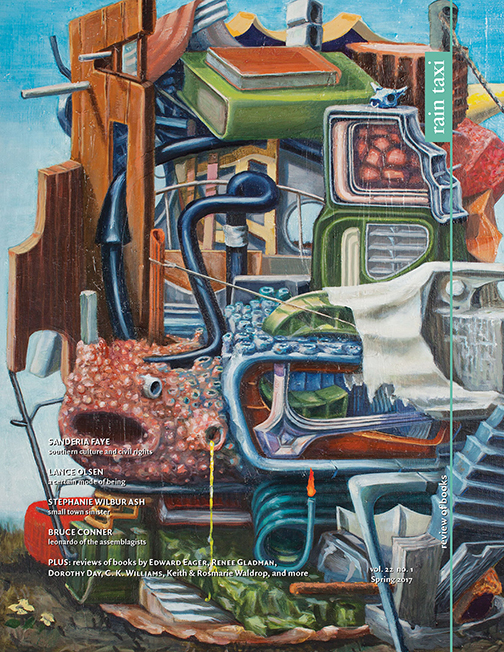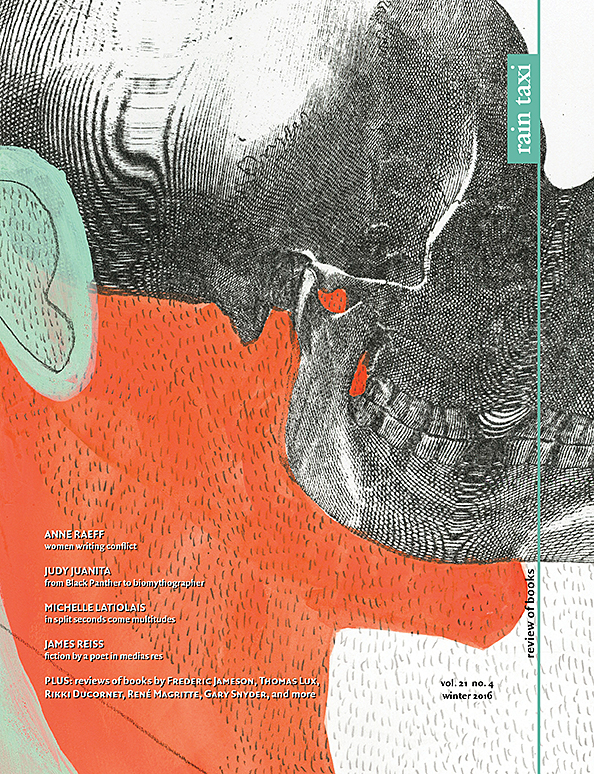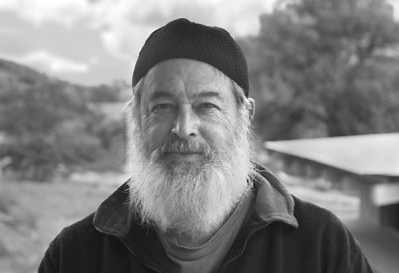 Catherine Pierce
Catherine Pierce
Saturnalia ($16)
by Allison Campbell
As way of introduction to Catherine Pierce’s third book, The Tornado is the World, you might watch the Motion Poem “The Mother Warns the Tornado.” The short film accomplishes what good trailers are meant to accomplish; you are left wanting more. The poem confesses, “I am a greedy son of a bitch, and there / I know we are kin.” In watching the eerie images unfold to form Pierce’s narrative—leaves fight in ominous wind, a floral-print mattress covers a claw-footed tub—and hearing the poet’s hollowed-out voice say, “I know I’ve already had more than I deserve,” readers are bound to feel greedy, to want the rest of the poems this voice and imagination have created.
In “True Story” Pierce writes, “no told story is ever true enough.” Her syntax creates a new noun, “told story,” an alternative to story, raising the question whether or not a story is, indeed, a story before it is told. Whether it is or not, in The Tornado is the World Pierce is set on exaggerating her way to reality, and I mean this in the best sense of exaggeration. In poem after poem, Pierce raises the stakes on what might otherwise be the emotionally mundane; voices of the tourist, teenage girl, and checkout clerk vacillate between cliché, comic, and sagacious. “I Used to Be Able to Listen to Sad Songs,” for example, begins with a simple and calm enough first line, but rapidly amps up after the first line break:
but that was before they started strutting
around with rocks in their fists, started
kicking the backs of my knees so that I
crumpled right there on the asphalt,
their faces streaming tears all the while.
That was before they started showing me
the switch blades in their boots. Before
the twisted arms and sucker punches.
Other addresses are more subdued, less hyperkinetic. “The Dog Greets the Tornado” has a narrative voice that calls to mind the sardonic narrator of Natsume Sōseki’s classic Japanese novel, I Am a Cat—while the cat says, “The truth may simply be that human society is no more than a massing of lunatics,” Pierce’s dog is more accepting:
Hello one-not-like-me. Hello
to your great tail. You are larger
than the truck that takes me
to the woods and back. You are larger
than the house I sometimes go in.
I see you coming close. I am blown
back on myself. My teeth buzz.Today I caught a squirrel. Today
I dug a patch of earth bare and slept
for a while. It was a good day.You are so large. The man is inside
the house. I feel my haunches needling up.And now the brown trees are below me.
The house is below me. The man
is below me. I am part of the sky.
I hear you howling. You must
have learned that from me.
The book contains many poems with tornado as theme or persona—poems that fluctuate between the strikingly grim and potently humorous—but Pierce’s work in The Tornado is the World is not limited by the theme. In “The Unabashed Tourist Brings Her Lover to the French Quarter,” she writes, “In this place / you can buy me a hurricane, and we can / stroll all night with storms in our hands.” The contrast between common consumption and catastrophe in the word “hurricane” creates a type of social, moral, and environmental whiplash. Pierce frequently pulls the rug-out-from under this way. In so doing, her poems remind readers that no one is immune to disaster. But the writing also highlights that forgetting and remembering our proximity to calamity is key to the beauty and absurdity of what it means to be utterly, vulnerably human.




 Stefanie Chambers is a Charles A. Dana Research Associate Professor of Political Science at Trinity College in Hartford, CT. Her research and teaching focus on migration, mayoral leadership, urban education, and environmental justice. Her latest book is Somalis in the Twin Cities and Columbus: Immigrant Incorporation in New Destinations (Temple University Press, 2017). She is also the author of the 2006 book Mayors and Schools: Minority Voices and Democratic Tensions in Urban Education, and is co-editor of the forthcoming volume The Politics of New Immigrant Destinations: Transatlantic Perspectives.
Stefanie Chambers is a Charles A. Dana Research Associate Professor of Political Science at Trinity College in Hartford, CT. Her research and teaching focus on migration, mayoral leadership, urban education, and environmental justice. Her latest book is Somalis in the Twin Cities and Columbus: Immigrant Incorporation in New Destinations (Temple University Press, 2017). She is also the author of the 2006 book Mayors and Schools: Minority Voices and Democratic Tensions in Urban Education, and is co-editor of the forthcoming volume The Politics of New Immigrant Destinations: Transatlantic Perspectives. Ahmed Ismail Yusuf is the author of Somalis in Minnesota (Minnesota Historical Society Press, 2012), an in-depth look at the state’s most recent immigrant group. He is also the author of Gorgorkii Yimi, a collection of short stories in Somali, and Lion’s Binding Oath, a new collection due to be released in August 2018, and his play A Crack in the Sky will be produced at the History Theatre in Saint Paul in February 2018. He has a BA from Trinity College in Hartford, CT. and an MPA (Master of Public Affairs) from the Humphrey Institute of Public Affairs of the University of Minnesota.
Ahmed Ismail Yusuf is the author of Somalis in Minnesota (Minnesota Historical Society Press, 2012), an in-depth look at the state’s most recent immigrant group. He is also the author of Gorgorkii Yimi, a collection of short stories in Somali, and Lion’s Binding Oath, a new collection due to be released in August 2018, and his play A Crack in the Sky will be produced at the History Theatre in Saint Paul in February 2018. He has a BA from Trinity College in Hartford, CT. and an MPA (Master of Public Affairs) from the Humphrey Institute of Public Affairs of the University of Minnesota. Jaylani Hussein is Executive Director of the Minnesota chapter of the Council on American-Islamic Relations (CAIR-MN). He has presented on the Somali Culture to diverse organizations across the US. With degrees from St. Cloud State University and North Dakota State University, he specializes in the areas of urban planning, community development, youth development, and legal and civil rights.
Jaylani Hussein is Executive Director of the Minnesota chapter of the Council on American-Islamic Relations (CAIR-MN). He has presented on the Somali Culture to diverse organizations across the US. With degrees from St. Cloud State University and North Dakota State University, he specializes in the areas of urban planning, community development, youth development, and legal and civil rights.





